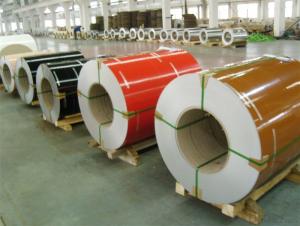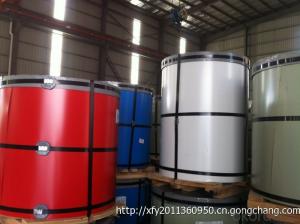PVEF Color Coating Aluminum Coil with High Quality
- Loading Port:
- Shanghai
- Payment Terms:
- TT OR LC
- Min Order Qty:
- 5 m.t.
- Supply Capability:
- 10000 m.t./month
OKorder Service Pledge
OKorder Financial Service
You Might Also Like
Item specifice
1. Specification of PVEF Color Coating Aluminum Coil with High Quality
Material | Alloy Aluminum 6063,6061,6005 or customer nominated |
Temper | T3, T4, T5, T6 |
Surface | Anodize, electrophoresis, powder coating, PVDF coating, wood grain painting, matted, etc. |
Colour | Any colour based on Standard Germany RAL Mark |
Length | Coating 6.5 meters, Anodizing 6.5 meters, Mill finish 5 meters |
Press Machine | 500-4000 tons all together 64 press lines. |
Fabrication | 1. Windows and doors; 2. Drilling; 3. Bending; 4. Cutting; 5. etc. |
Certificate | ISO 9001 |
Moulding | 1. Using our moulds, no fee; |
2. Using customer drawing, opening mould, usually about 10~50 tons then the moulding can be refunded. | |
3. Mould cost is negotiable base on the order quantity | |
Capability | Annual output 100,000 tons |
2. Application of PVEF Color Coating Aluminum Coil with High Quality
(1).Interior: wall cladding, ceilings, bathrooms, kitchens and balconies, shutters, doors...
(2).Exterior: wall cladding, facades, roofing, canopies, tunnels,column covers , renovations...
(3).Advertisement: display platforms, signboards, fascia, shop fronts...
3. Feature of PVEF Color Coating Aluminum Coil with High Quality
*Such coil is specially designed to replace aluminum ingot, due to the high export tax of aluminum ingot, the coil has better price than ingot.
*This type of coil can fit customer's remelting furnace just like ingot, no need to make any change to the production line that was previously used for ingot. The standard coil size and weight is very suitable for the feed gate of furnace.
*This type of coil causes less material wastage than ingot when remelted.
*Our coil is made directly from ore, no need to go though the ingot making process, quality is much better than other suppliers who use ingot scrap to make coil.
Be free from Oil Stain, Dent, Inclusion, Scratches, Stain, Oxide Dicoloration, Breaks, Corrosion, Roll Marks, Dirt Streaks and other defect which will interfere with use
4. Certificate:
SGS and ROHS(if client request, paid by client), MTC(plant provided), Certificate of Origin(FORM A, FORM E, CO), Bureau Veritas and SGS (if client request, paid by client), CIQS certificate
5. Image of PVEF Color Coating Aluminum Coil with High Quality
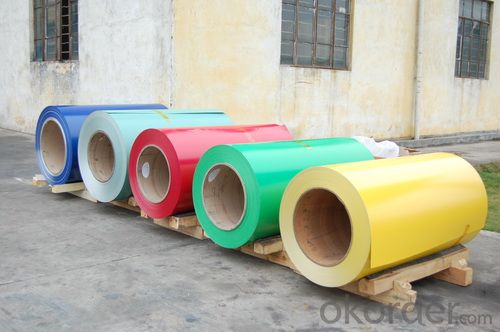
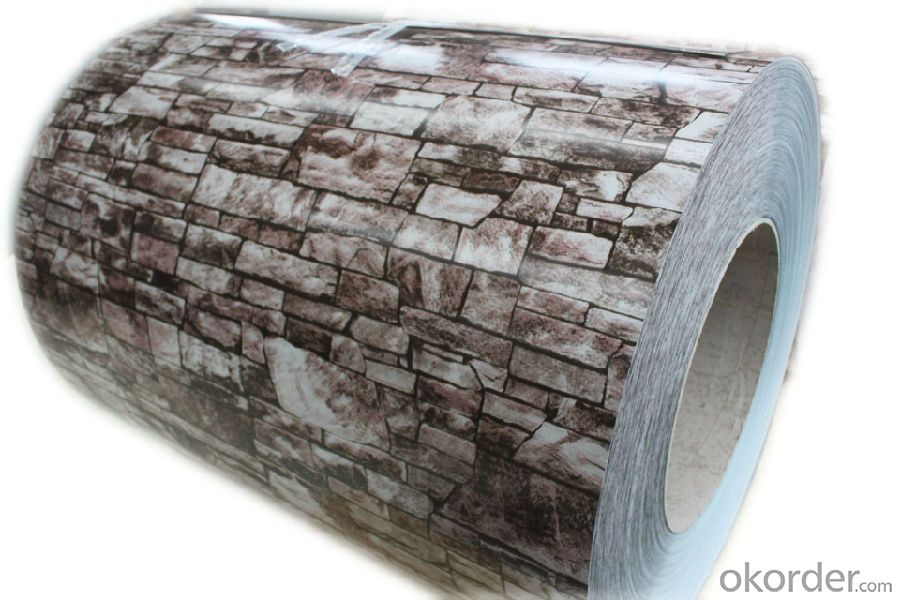
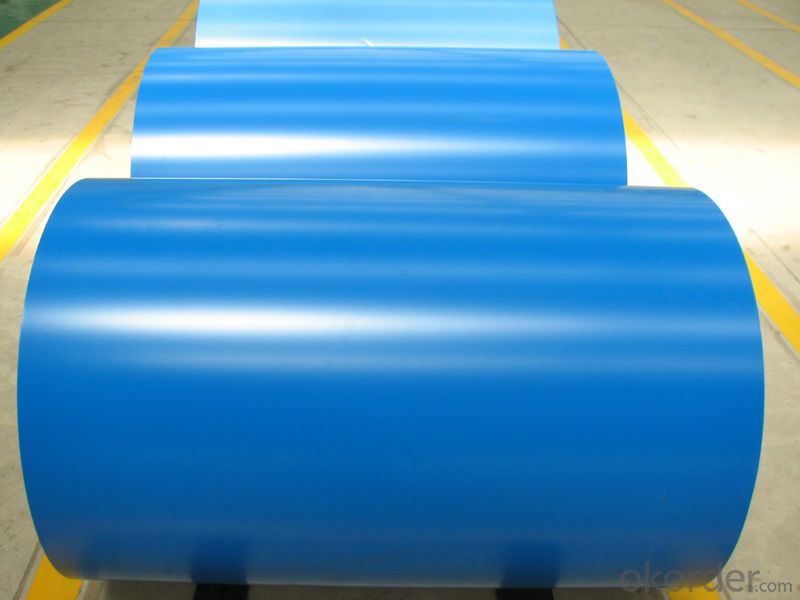
6. Package and shipping of PVEF Color Coating Aluminum Coil with High Quality
eye to wall
eye to the wall
with wood pallet (wooded case also available)
7. FAQ
1) What is the delivery time?
Dpends on actual order, around 20 to 35 days
2)What is the QC system:
We have QC staff of 20 persons and advanced equipment, each production is with MTC traced from Aluminum ingot lot.
3) What market do you mainly sell to?
Australia, America, Asia, Middle East, Western Europe, Africa etc
- Q:What are the potential applications of coil-laminated aluminum coils?
- Coil-laminated aluminum coils have a wide range of potential applications in various industries. They can be used in the manufacturing of automotive parts, such as body panels and interior components, due to their lightweight yet durable nature. Additionally, they are suitable for building and construction purposes, including roofing, siding, and insulation, as they offer excellent corrosion resistance and thermal conductivity. Furthermore, coil-laminated aluminum coils find use in electrical industries for producing transformers, capacitors, and other electrical components due to their excellent electrical conductivity. Overall, their versatility and desirable properties make coil-laminated aluminum coils valuable in numerous applications across different sectors.
- Q:Can aluminum coils be used in the manufacturing of automotive wheels?
- Yes, aluminum coils can be used in the manufacturing of automotive wheels. Aluminum is a lightweight and durable material that is commonly used in the production of wheels due to its high strength-to-weight ratio and corrosion resistance. It allows for better fuel efficiency and improved vehicle performance.
- Q:Are aluminum coils suitable for insulation jacketing?
- Yes, aluminum coils are suitable for insulation jacketing. Aluminum is a highly durable and corrosion-resistant material that can effectively protect insulation materials from external elements. Additionally, aluminum coils offer excellent heat and moisture resistance, making them an ideal choice for insulation jacketing applications.
- Q:Can aluminum coils be customized in terms of thickness?
- Yes, aluminum coils can be customized in terms of thickness. The thickness of aluminum coils can be adjusted according to the specific requirements of a particular application. This customization is achieved through a process called aluminum coil slitting, where the original coil is cut into narrower coils of desired thickness. This allows for flexibility in meeting various needs and specifications of different industries.
- Q:How do aluminum coils compare to steel coils in terms of strength?
- Aluminum coils are generally not as strong as steel coils in terms of strength. Steel coils have a higher tensile strength and are more resistant to deformation and breaking under stress compared to aluminum coils.
- Q:Can aluminum coils be used in automotive body panels?
- Yes, aluminum coils can be used in automotive body panels. Aluminum is a lightweight and corrosion-resistant material, making it an ideal choice for automotive applications. The use of aluminum coils in body panels offers several advantages, including improved fuel efficiency due to the reduced weight of the vehicle, better handling and maneuverability, and enhanced durability. Additionally, aluminum is highly recyclable, making it an environmentally friendly option for automotive manufacturing. Many automakers have already started incorporating aluminum coils in their vehicles, and this trend is expected to continue as the industry strives for lighter and more sustainable vehicles.
- Q:Can aluminum coils be used in the production of cryogenic storage tanks?
- Yes, aluminum coils can be used in the production of cryogenic storage tanks. Aluminum is a suitable material for cryogenic applications due to its low density, high thermal conductivity, and excellent corrosion resistance. These properties make it ideal for storing and transporting cryogenic liquids such as liquid nitrogen, oxygen, and argon. Aluminum coils can be used to fabricate the inner shell of the storage tank, providing a lightweight and durable solution. Additionally, aluminum is easily formable, allowing for the creation of complex tank shapes and designs. However, it is important to note that aluminum has a higher coefficient of thermal expansion compared to other materials like stainless steel, so proper design considerations must be taken to accommodate for thermal contraction and expansion during cryogenic operations.
- Q:Can aluminum coils be anodized for enhanced durability?
- Yes, aluminum coils can be anodized to enhance their durability. The anodizing process creates an oxide layer on the surface of the aluminum, making it more resistant to corrosion, wear, and abrasion. This improves the overall lifespan and performance of the coils.
- Q:What are the different types of end conditions for aluminum coils?
- Aluminum coils have several types of end conditions, which determine how the ends of the coil are prepared for different applications. Some common end conditions for aluminum coils are as follows: 1. Mill Finish: This is the most basic and widely used end condition for aluminum coils. In mill finish, the coil ends are left untouched after coming off the rolling mill, without any additional processing or finishing. This end condition is suitable for applications where the appearance of the ends is not crucial. 2. Trimmed or Sheared: In this end condition, the coil ends are trimmed or sheared to eliminate any uneven or rough edges. This results in clean and smooth ends, which are often necessary for applications that require precise fitting or appearance. 3. Slit: Slitting refers to cutting an aluminum coil into narrower strips or coils. Slitting is commonly done to customize the width of the coil according to specific requirements. The ends of slit coils can have either mill finish or trimmed ends, depending on the desired application. 4. Recoiled: Recoiling involves rewinding a coil into a smaller or larger coil diameter. This end condition is frequently employed when smaller coils are needed for storage, transportation, or further processing. Recoiling can be done with or without additional trimming or shearing of the ends. 5. Flattened: Flattening is the process of unrolling and flattening the coil to create a sheet or plate. This end condition is often used when the aluminum is intended for further fabrication, such as stamping, forming, or cutting into specific shapes or sizes. The ends of flattened coils are typically trimmed to ensure a clean edge. It is important to note that the specific end condition required for aluminum coils may vary depending on the intended application and customer specifications. Different industries and uses may have unique end condition requirements to ensure optimal performance and appearance of the aluminum coils.
- Q:does anyone know any ANTI-PERSPIRANTS that don't have any harmful chemicals such as aluminum chloride? I need something that makes you not sweat but I don't want bad chemicals in it!
- I have thoroughly researched this, as I have been wanting the same thing and was going to post this exact question myself. After A LOT of research, I have learned that aluminum and all aluminum based chemicals in antiperspirants are what keeps us from sweating. Therefore, they all have it, it is just a matter of what percentage. I found a posting by Dt. Stephen Z. Fadem, MD, FACP. He is a member of the AAKP Medical Advisory Board. He claims the the FDA came to a conclusion that aluminum is safe when used according to the directions. I have my doubts on this. The American Cancer Association found inconclusive evidence that the aluminum in antiperspirants is related to breast cancer. I am frustrated by this as well as I need antiperspirants too. However, I learned that if you switch to just a deodorant, your armpits still sweat, (as this is a natural way for your body to get rid of toxins, but gross), but not as much. I have also learned that if you don't allow your body to get rid of the toxins in this manner, some toxins are stored in a gland near your breasts and this one of the ways that many people believe you get breast cancer. There are several other places that your body sweats out toxins as well, including behind your knees. Sorry I couldn't be more help, but unfortunately, there is no such thing.
1. Manufacturer Overview |
|
|---|---|
| Location | |
| Year Established | |
| Annual Output Value | |
| Main Markets | |
| Company Certifications | |
2. Manufacturer Certificates |
|
|---|---|
| a) Certification Name | |
| Range | |
| Reference | |
| Validity Period | |
3. Manufacturer Capability |
|
|---|---|
| a)Trade Capacity | |
| Nearest Port | |
| Export Percentage | |
| No.of Employees in Trade Department | |
| Language Spoken: | |
| b)Factory Information | |
| Factory Size: | |
| No. of Production Lines | |
| Contract Manufacturing | |
| Product Price Range | |
Send your message to us
PVEF Color Coating Aluminum Coil with High Quality
- Loading Port:
- Shanghai
- Payment Terms:
- TT OR LC
- Min Order Qty:
- 5 m.t.
- Supply Capability:
- 10000 m.t./month
OKorder Service Pledge
OKorder Financial Service
Similar products
New products
Hot products
Related keywords
